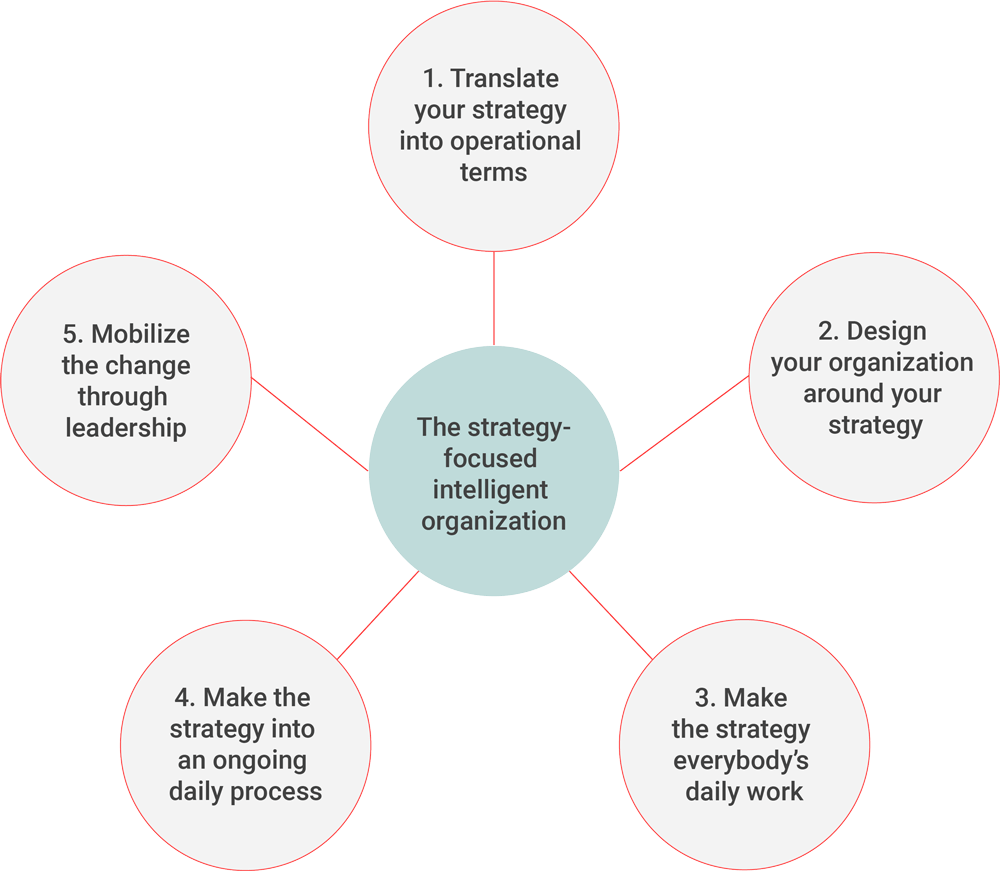5 steps to a strategy-focused intelligent organization
The consultants and interim managers of Passionned Group help you reach the final destination in 5 clear steps: a strategy-focused intelligent organization. First you start by translating the strategy into operational terms so that the woolly or abstractness disappears. And then we align the organization with the strategy (and not the other way around), and we make that strategy alive so that everyone can contribute to it every day. So we make strategy a daily process. This total transition, of course, requires strong and effective leadership.
 Figure 1: Clockwise: the 5 steps to achieve your strategic goals faster.
Figure 1: Clockwise: the 5 steps to achieve your strategic goals faster.
1. Translate your strategy into operational terms
You have to translate an organization’s vision and strategy in such a way that every employee knows how to act on it. This requires a new performance management framework. You are going to embed the strategic goals in the daily work.
You can easily fill in the strategic goals using a strategy map and the balanced scorecard. With this, management forces itself to express the vision in terms that everyone can understand. It also allows organizations to combine their resources and capabilities to create value for specific customers or groups of customers.
Commercial organizations should shift the emphasis from measuring results to measuring processes, their inputs and their critical factors. Public organizations should shift from measuring inputs to measuring significant results for customers and other stakeholders.
2. Align your organization with your strategy and not the other way around
The ultimate goal of any organization is to create synergy. For organizational performance to be more than the sum of its parts, connect and integrate individual strategies.
Organizations are traditionally built around different functions. Each function has its own knowledge and specialty. However, most organizations experience many problems coordinating the various functions. This results in functional silos. These are often quite a barrier to strategy execution.
Strategy-focused organizations are able to break through the barriers that exist between functions. Strategic themes and priorities are given focus through a strategy map. This gives the organizational units a consistent direction and set of priorities. This ensures that the whole is greater than the sum of its parts.
3. Make strategy everyone’s daily work
Once a new strategy is established, top management cannot implement it alone. It requires active contribution from everyone in your organization. Strategy-focused organizations ensure that all employees fully understand the strategy. And that they can carry out their daily work in a way that contributes to the success of the strategy.
So this comes down to good communication, working together and monitoring and sharing the right indicators with business intelligence. Concrete metrics and objectives make it easier to focus on. This also helps you identify key priorities and get to work on them.
4. Make your strategy a daily ongoing process
Within many organizations, management is based on budgets and work plans. Strategy-focused organizations use a process to manage strategy. They view financial budgets, monthly reviews and strategy as an ongoing process.
New ideas and learning within an organization arise daily. Instead of “waiting” for the new budget cycle, they start adjusting priorities and scorecards and KPIs directly to reality. They do this based in part on analysis and dialogue about the numbers.
So monitoring execution is very important in this. The core of it is to identify the actions to meet the targets. Check out the 7 key features of unadulterated KPIs here.
5. Mobilize change through strong leadership
The most important requirement to successfully implement your strategy is active management involvement combined with strong leadership. A new strategy requires changes in every part of the organization and teamwork to coordinate and implement these changes.
Therefore, management’s first task is to convince employees of the need for change. As long as they communicate the strategy clearly, the next task is to let go of traditional consultation structures, which are mostly based on power. You can replace these, for example, with strategy teams as part of open communication.
In open communication, the best ideas will emerge. Employees will find their entrepreneurial spirit again. It will encourage them to achieve what is best for themselves, and therefore for the interests of the organization.
Related articles
More robust strategy development with Data Analytics
Business Intelligence & Data Analytics encourages organizations to develop strategic management even better and more robustly. One way this happens is by mapping the actual operation and performance of the organization in relation to the environment. On the one hand, because managers and knowledge workers can make faster and better decisions through BI and spend less time collecting data. On the other hand, because all kinds of connections with BI can be uncovered when additional data sources are added: enterprise BI. This gives the organization more time and space to deal with the strategy, mission and goals and can often formulate and manage them in a much more explicit and goal-oriented way.
With Business Intelligence you align the strategic initiatives
 In practice, we see that application of Business Intelligence plays an important role in communicating an organization’s vision and strategic policies, communicating and linking strategic goals with metrics, the budgeting process and aligning strategic initiatives. Business Intelligence also allows organizations to get feedback on whether their strategy is working (Kaplan and Norton, 1998). We commonly use KPI dashboards for this purpose. Testing an organization’s strategy and making all kinds of connections visible is perhaps the most important contribution Business Intelligence can make.
In practice, we see that application of Business Intelligence plays an important role in communicating an organization’s vision and strategic policies, communicating and linking strategic goals with metrics, the budgeting process and aligning strategic initiatives. Business Intelligence also allows organizations to get feedback on whether their strategy is working (Kaplan and Norton, 1998). We commonly use KPI dashboards for this purpose. Testing an organization’s strategy and making all kinds of connections visible is perhaps the most important contribution Business Intelligence can make.
With BI & Analytics, you work on the mission from top to bottom
This requires that employees from high to low, and in cohesion, can work to fulfill the organization’s mission by devising and executing various strategies. Business intelligence engages employees in the affairs of an organization. By sharing specific information and knowledge, employees are more likely to participate in change processes that should lead to improvement. They are more involved in the ups and downs of the company.
Involvement is a very important success factor
Kahaner (1996) writes in his article on Business Intelligence classics that personal involvement of employees in Business Intelligence is a key success factor. Kaplan and Norton (1998), in turn, emphasize that it is of utmost importance that financial and non-financial information should be part of information systems used by employees of every level in the organization.
With BI & Analytics, you translate your strategy into action faster
An organization’s strategy can then be more quickly translated into action, which takes place on the shop floor. Employees then know what the organization stands for, what its mission is and what its key objectives are. But also how these relate to departmental goals and one’s personal goals. Coming up with a strategy is not that difficult, seeing it implemented is (Meijers, 2002). Passionned Group specialists have decades of experience in guiding organizations to achieve their strategic objectives. With our proven successful concept, our clients actually succeed in being much more effective and fulfilling their goals and strategies.
Want to start directly formulating strategic goals?
Prefer not to experiment yourself? Let the Passionned Group specialists guide you on your way to success and achieve your strategic goals faster than yesterday and with more power than the competition. We are happy to help you implement a robust, data-driven and agile organization. Contact us to get advice.
About Passionned Group
 The Passionned Group is a consulting firm that helps you achieve your strategic goals faster. Our consultants can guide you through the change process to make your organization agile to the strategy. We also make sure that your strategy comes to life for everyone in your organization.
The Passionned Group is a consulting firm that helps you achieve your strategic goals faster. Our consultants can guide you through the change process to make your organization agile to the strategy. We also make sure that your strategy comes to life for everyone in your organization. 




























